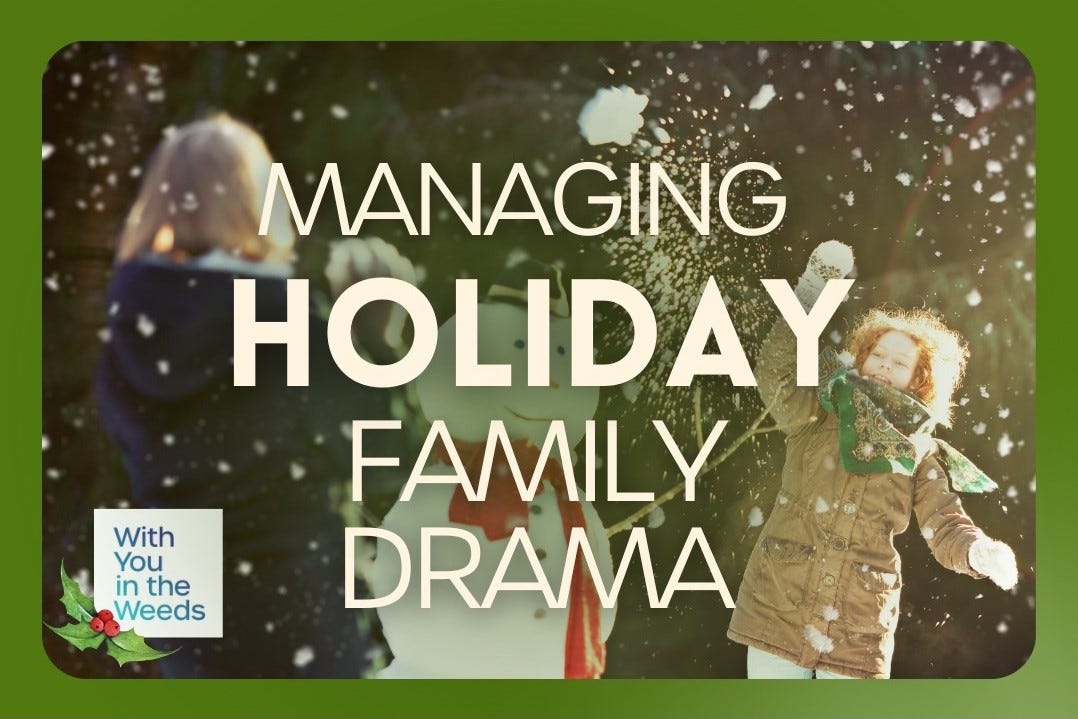Managing Holiday Family Drama
Realistic expectations for the holiday season
Are you looking forward to being with your family over the holidays? Or are you dreading the next family get together? Family drama can not only ruin the holiday spirit, but it can also create hurt and division in a family that’s felt for years to come.
In the first episode of our holiday miniseries, Keeping Your Sanity Over the Holidays, John and Lynn help you identify the pain points that lead to family drama, and the best ways to manage holiday stress:
Unrealistic expectations
“Hot topic” conversations
Complex family logistics
Strained relationships
Healthy coping strategies that really work
Brace for Holiday Impact
The holidays are like a Play-Doh press. When you were little, you might have enjoyed pushing Play-Doh through a shape. The holidays do that to you - they press on you and they have an impact. So we want to figure out a way to identify some insights and strategies to help you navigate the big issues.
We’re going to focus today on family dynamics. That’s a big topic, and we’re not going to address every issue, because we could do an episode on each of these pain points. Instead, we’re going to give you very practical takeaways that you can apply in all of your family encounters this holiday season.
Unrealistic Expectations
Many of us enter the holiday season with an ideal picture of what each occasion is going to look like and how people will act. When you put those expectations on your family and others, you can be very disappointed when reality falls short of the ideal.
One helpful way to think about expectations is viewing them as pre-planned resentments. What you’re really doing is identifying an outcome that you want, and that sets you up for disappointment. It can also make you feel pressured to manipulate things so that your desired outcome becomes a reality.
Instead, it’s helpful to think of expectations as desires. It’s okay to desire things. God wired us for that. So you might desire everyone to have a wonderful time. But that leaves the door open for someone to not have a good time. You may not have the best Christmas this year, but maybe you’ll have a good time five years from now. In the meantime, accept reality and work with what you have – and leave the door open for what God might do.
“Hot Topic” Conversations
There can be a lot of minefields when family gets together. Politics, finances, parenting, religion. Go into the holidays knowing that people are different – it’s okay that they don’t all feel the same way you do about every issue. You don’t have to change anyone’s mind.
When it comes to hot topics, think about conversations like walking through a national park. Once you’re in the park, there are lots of different trails you can take. One trail head might take you to a waterfall. One trailhead might take you to a mountain range. But you can choose which trail you go down. Imagine all these potentially sticky conversations as trails. You can choose which trail you take!
If someone else starts to talk about a controversial issue, you can even share this analogy with them and say, “Can we not go down that trail right now?” That’s a good boundary to have going into the holidays.
Complex Family Logistics
Another thing that can stir up family drama is the logistical stress of managing schedules and trying to accommodate everyone. That can create a lot of pressure. Perhaps you have a large extended family, or you come from a family of divorce, where there may be multiple sets of parents. There’s a lot of expectation to spend time with each branch of your somewhat complicated family tree.
At the end of the day, you probably can’t please everyone. No matter how hard you try, someone may be upset. Give yourself some grace in that situation. See yourself as human – human beings are limited by our very nature. God did not create us to be able to take in unending stimulus and everyone’s limits are different. If you set a limit for yourself and someone is disappointed, you need to manage your emotions around that person’s disappointment.
Strained Relationships
For some people, the holidays may be the only time that they interact with certain family members. That feels abnormal and possibly uncomfortable. You may not know the other person very well or feel like you have anything in common with them. On the other hand, there may be some very hard relationships with deep hurt over many years. There’s a history there. And you have anxiety going into those family functions because those relationships are strained.
Here’s our word of advice to you: Don’t use the holidays to repair difficult or rusty relationships. The word ‘rusty’ is exactly right here. The relationship hasn’t been maintained, well-oiled, or tended to. If it's really intense and loaded with potential conflict, don't use the holiday as a time to do that. Don't sidle up to the appetizer table and bring up some deep-seated conflict that has not been addressed. The holidays aren’t a time to heal deep historical pain or solve conflict.
Here’s our word of advice to you: Don’t use the holidays to repair difficult or rusty relationships, heal deep historical pain, or solve conflict.
Coping Strategies
1. Set boundaries
As you go into the holidays, you can set boundaries with friends and family, especially when it comes to topics or behavior that is off-limits. If someone brings up a contentious topic: you have options, you can redirect the conversation, change the subject, or leave the room. You might have a family member who likes to push people’s buttons to get reactions. Instead of taking the bait, have an exit strategy.
Your exit strategy can be something that you plan ahead of time, even script out like dialogue in your head. If you know that you're going to have a family member that's difficult, rehearse it so that you're prepared. Let them know that you’re not going to engage, and if they keep trying, you can leave the room. Boundaries are powerful because the boundary itself is the mechanism of force. It doesn’t have to be your anger or emotion.
2. Practice self-care
In order to practice self-care, you need to know yourself, know your emotional state, and accept how much you are able to handle before you need a break. Self-care differs for everybody: it can be exercise, a walk, bubble bath, music, a massage, or reading. What comforts you? What helps you relax in times of stress? Think of the advice you would give a friend in your situation. Take some time for yourself during the rush of the holidays.
3. Focus on the positives
We tend to put people in categories like they're all good or all bad. That can set you up to have a negative filter and then you’re annoyed by everything they say or do. If you only focus on their flaws, it will put you in a head space of being very critical of others. Instead, coach yourself to see people’s multi-dimensionality, and focus on their good qualities.
4. Engage in fun activities
Be sure to plan some things that are lighthearted: watching a favorite holiday movie, decorating Christmas cookies, building a snowman, driving around to look at Christmas lights, or perhaps playing board games or video games. Not everyone will like all of these activities, so don’t make them mandatory. Just offer them as options and let people choose what they like to do.
5. Take breaks
Schedule some downtime for yourself and others. Not every minute has to be scripted! Give yourself time to read a book, take a nap, or go for a walk. You don’t need to spend every moment of the holidays with your family. Your body and your brain can’t keep up with that. It’s okay for people to spend some time apart.
6. Accept family imperfection
Remember, when your extended family comes together, it’s imperfect people spending time with other imperfect people. It’s unrealistic to expect your time together to be perfect. This is where the Serenity Prayer can be very helpful. Most people are familiar with the first part of it, “God give me the serenity to accept what I can't change, courage to change what I can, wisdom to know the difference.”
They're not as familiar with the second part of the prayer, which really speaks to this idea of accepting imperfection: “Living one day at a time, enjoying one moment at a time, accepting hardships as the pathway to peace, taking as Jesus did this sinful world as it is, not as I would have it, trusting that He will make things right if I surrender to his will so that I may be reasonably happy in this life [during the holidays] supremely happy with God forever and ever in the next life.”
7. Limit alcohol consumption
Some of you may not drink at all, so this won’t apply to you, but for those who do: think twice about using alcohol as a coping mechanism during the holidays. It may feel helpful in the moment, but it can actually make things worse. A lot of people think “I can't go through this holiday without drinking”. And what they're really saying is, it's going to help me cope with the difficulties.
When you use alcohol as a coping mechanism, you become dependent on it to regulate your emotions. We’re not here to say that you can’t drink, but we recommend taking a minute to think about the relationship you have with alcohol. Perhaps you can entertain the idea of having a two-drink or a three-drink limit.
8. Seek outside support
If you’re going into a difficult family situation, ask a friend to pray with you or pray for you. And you can ask them to check on you by sending a text, asking you how it’s going, maybe including a Bible verse or word of encouragement. It requires you to be vulnerable and honest with your friend about your situation. But a text like that can turn your whole day around – and you will know you’re not alone.
9. Have your own family holiday
If you're one of those families that has to divide your time between two sets of in-laws and extended cousins and uncles, it's okay to have your own celebration with your nuclear family. Even at the beginning of your marriage, when you’re still a couple, it’s helpful to designate a holiday as your own. There is real value in focusing just on your own family unit.
That’s not to disregard other family members, but you need to establish traditions and togetherness that is unique. In the same vein, keep visits to other families short. There is something about the second- or third-day mark that is attractive as a departure point. It’s okay to have short stays, and that can be wise and helpful.
Rediscovering the Essence of the Holiday Season
While we can’t promise you the perfect Hallmark holidays, we do know that accepting people for who they are, communicating healthy boundaries, and setting aside time to rest and recharge can help you enjoy the real reason for the season.
We’ve covered lots of difficult relationship dynamics in our previous series; we recommend you check them out and listen to any episodes that seem applicable to your situation:




